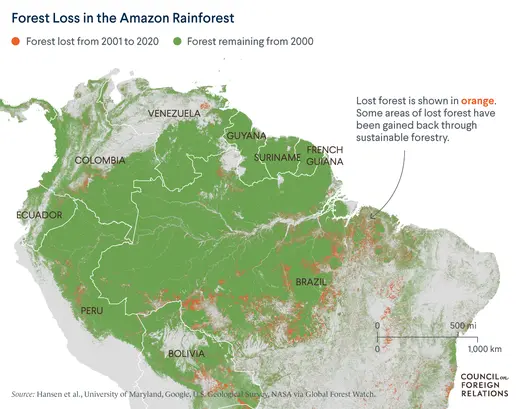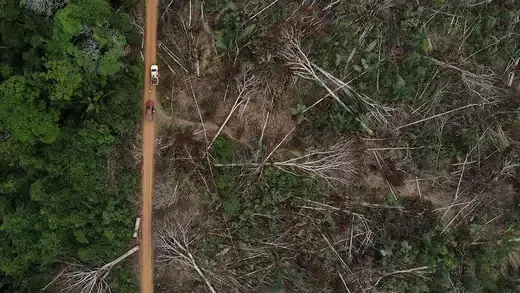Deforestation of Brazil’s Amazon Has Reached a Record High. What’s Being Done?
Scientists say the rain forest is approaching a critical tipping point at which the damage is irreversible.
Deforestation of the Amazon Rainforest is threatening to accelerate past a point of no return. Countries and international organizations have called on Brazilian President Jair Bolsonaro to strengthen environmental protections and Indigenous land rights that he has weakened since taking office.
What is the current state of the Amazon Rainforest?
Scientists warn that the world’s largest rain forest is approaching a critical tipping point past which there could be severe, irreversible consequences for the planet.
New data from Brazil’s National Institute for Space Research shows that more than 3,980 square kilometers of the Amazon—an area five times the size of New York City—were cleared in the first six months of 2022, the highest figure in at least six years. Continued deforestation of the rain forest is contributing to a loss in resilience, or the forest’s ability to recover from droughts, fires, and landslides. If this continues, it could cause the Amazon’s traditionally wet, tropical climate to dry out, a phenomenon known as “dieback.” It’s estimated that between 17 and 20 percent of the Amazon has been destroyed over the past fifty years, and some scientists believe that the tipping point for dieback is between 20 and 25 percent deforestation.
International demand for beef and soy incentivizes ranchers to clear the land for cattle ranching and soybean production. Brazil is currently the world’s top exporter of beef and soy, exporting more than $35 billion worth of those products in 2020.

Why does it matter?
The Amazon plays a critical role in climate regulation. Often referred to as “the lungs of the Earth,” it produces between 6 and 9 percent of the world’s total oxygen and long functioned as a carbon sink, absorbing more carbon dioxide than it emitted. However, scientists say parts of the Amazon now emit more carbon dioxide than they absorb. This puts the Amazon’s rich biodiversity at risk: frequent fires, hotter temperatures, and changing rain patterns damage the habitats of the forest’s more than three million species, thousands of which are endangered.
Also under threat are nearly four hundred Indigenous tribes. Deforestation has displaced several of them, inspiring Indigenous-led protest movements across Brazil. In 2021, there were 305 cases of illegal occupation of Indigenous land, which human rights groups have attributed to Bolsonaro’s continued efforts to dismantle protections for Indigenous communities. In August 2021, a coalition of Brazilian Indigenous rights groups petitioned the International Criminal Court to investigate Bolsonaro for alleged crimes against humanity and genocide.

How did we get here?
Large-scale deforestation of the Amazon began in the 1960s, but it has accelerated under Bolsonaro, reaching a fifteen-year high in 2021. Since taking office in 2019, his government has scaled back the enforcement of environmental laws and pushed to open Indigenous lands to commercial exploitation. When widespread fires broke out in 2019, Bosonaro rejected millions of dollars in aid from the Group of Seven (G7), claiming the G7 sought to infringe on Brazilian sovereignty.
His administration has also weakened existing environmental protections. In addition to approving a 24 percent cut to the 2021 environment budget, Brazil’s Congress passed several measures that reduced citizen representation on environmental policy counsels and replaced environmental policymakers with military officials. Other efforts, including bills that would legitimize illegal squatting and erode protections for Indigenous territories, are still being deliberated.
Still, Bolsonaro has taken some steps to protect the Amazon. In January 2020, he announced the creation of an Amazon Council, consisting of fourteen cabinet members but no governors from Amazonian states, to oversee sustainable development efforts. And in May of that year, he tasked the country’s armed forces with responding to environmental crimes committed in the forest. His administration has also begun to increase the fines issued for environmental crimes. However, critics say the reliance on the military to enforce environmental protections has often undercut the work of federal environmental agencies and failed to achieve significant results.
What are the options going forward?
Bolsonaro faces growing international pressure to address deforestation. During U.S. President Joe Biden’s 2021 Leaders Summit on Climate, Bolsonaro promised to end illegal deforestation by 2030 and achieve carbon neutrality by 2050. At the United Nations’ twenty-sixth Conference of the Parties (COP26) in Glasgow later that year, he made a more ambitious pledge to end deforestation by 2028.
The president could also see financial pressure ramp up ahead of his bid for reelection in October 2022. Germany and Norway gave billions of dollars to Brazil’s Amazon Fund, created in 2008 to promote sustainable use of the rain forest, but those countries have frozen that support. Likewise, Brasilia and Washington have been negotiating a proposed $20 billion U.S. donation to help conservation efforts, but talks have stalled over Bolsonaro’s policies. Deforestation has also played a role in the European Union’s delay in ratifying a comprehensive trade agreement with the Mercosur trade bloc, of which Brazil is a member.
Michael Bricknell and Will Merrow created the graphic for this article.